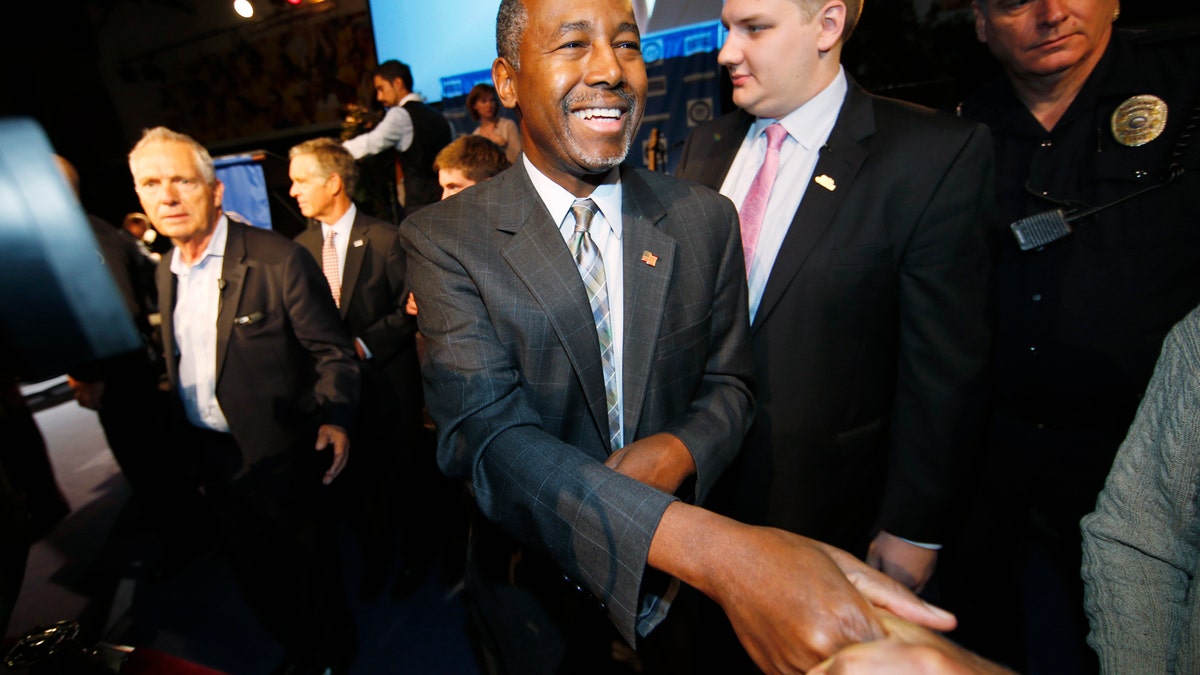
Oct. 29, 2015 - Republican presidential candidate Ben Carson greets well-wishers during a campaign stop in Lakewood, Colo. ((AP))
The top two presidential frontrunners of the Republican Party, Donald Trump and Ben Carson are not your traditional politicians. In fact, neither of them have any political experience and their campaigns seem to have been catapulted by their “outsider” status.
Republican voters appear to be looking for a different type of candidate.
Donald Trump’s success may be explained in part by his celebrity status and household name recognition. Both candidates snub political correctness and tell voters exactly what is on their minds. However, Ben Carson stands out in a way that no other major candidate has for the past 100 years: he has a goatee.
It has been 100 years since a major presidential candidate sported facial hair. Hat tip to Charles Evan Hughes, who lost a narrow election to incumbent Woodrow Wilson in 1916.
Several explanations have been given for this phenomenon, including the invention of the conventional Gillette safety razor, and the association of facial hair with hippies and communists (think Karl Marx or Fidel Castro).
Beards are in vogue, and facial hair could help address the gender gap. One study found that women were most attracted to men’s faces with heavy stubble, while full bearded men were perceived to be healthier and more protective. These are important attributes for a prospective commander-in-chief.
As the other Republican candidates struggle to create narratives to achieve their own outsider status and close the gulf between them and the frontrunners, the answer is right under their noses: grow a beard.
This might not work well for Carly Fiorina, but third quarter FEC financial disclosures and recent polls show that some of the other Republican candidates may need to resort to desperate measures.
By growing a beard, a candidate would see Carson’s goatee and raise him a beard. The candidate would immediately join Carson in bucking a 100-year old tradition, and they would challenge the current frontrunners to the title for the most unconventional candidate in the race.
Recently, John Fetterman announced his candidacy to be the Democratic nominee for U.S. Senate in Pennsylvania. Fetterman is not your stereotypical politician. His unusual physique gained instant national media exposure. Bald-headed, tattooed, and standing at 6’8” and 350 lbs, he looks more like an extra on Sons of Anarchy than a two-term, small town mayor.
Breaking the political mold could be an effective strategy to boost a candidate out of obscurity and propel his campaign to the national spotlight. Imagine the countless hours of free airtime on 24-hour cable news as political pundits dissect and overanalyze the candidate’s “beard strategy.”
Not to mention, in a matter of hours the candidate’s beard will undoubtedly have its own Twitter feed.
However, there are other benefits to growing a beard than simply the incessant coverage that will ensue. A recent study by University of Western Australia researchers has shown that beards are a sign of dominance among primates, particularly in large groups where there is bound to be more competition among males. In the crowded Republican field, a bearded candidate could intimidate and even scare away his competition.
Another study in the Journal of Marketing Communications has shown that when it comes to selling a product, men with beards are considered to be trustworthy.
Not to mention the increasingly popular No-Shave November in support of cancer awareness. According to the National Cancer Institute, cancer impacts the lives of millions of Americans (approximately 39.6% will be diagnosed with cancer at some point during their lifetimes). Showing solidarity with a cause that afflicts so many people can demonstrate a candidate’s empathy and compassion toward others.
Of course, it is no secret that the Republicans suffer from a gender gap. According to Gallup presidential exit polls, 14% and 12% more women voted for Obama in 2008 and 2012 respectively. Beards are in vogue, and facial hair could help address the gender gap. One study found that women were most attracted to men’s faces with heavy stubble, while full bearded men were perceived to be healthier and more protective. These are important attributes for a prospective commander-in-chief.
Finally, in professional sports it is quite common for men to grow a “playoff beard.” It is most commonly associated with NHL playoff hockey. But playoff beards have cropped up in other sports too.
For some players, it is a practice rooted in superstition. For some Republican candidates, superstition may be all they have left.
